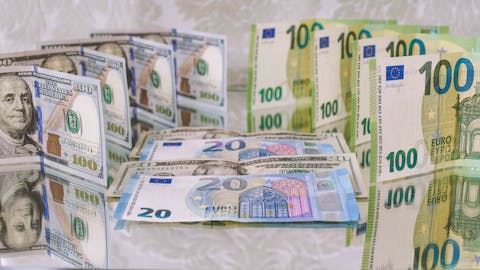In this article, we will take a look at 8 Best German Dividend Stocks To Invest In.
Europe’s economy might see some positive developments in 2025, but risks still loom. Strong U.S. growth could boost demand for EU exports while easing inflation in Europe may lead the ECB to cut interest rates, spurring investment and economic growth. A potential increase in U.S. fossil fuel production could lower global oil prices, benefiting oil-importing countries like those in the EU. Additionally, US tax cuts might strengthen the dollar, making European goods more competitive globally. However, the EU’s growth prospects hinge on geopolitical stability. Escalations in conflicts like the war in Ukraine, tensions in the Middle East, or a possible China-Taiwan crisis could derail this cautiously optimistic outlook.
Despite these challenges, Goldman Sachs Research is optimistic about European stocks in 2025, expecting the European index to deliver around a 9% total return, despite challenges like political uncertainty and slow economic growth. In a recent discussion with Sharon Bell, a senior strategist at Goldman Sachs, she explained that while they’ve slightly lowered their forecasts for the index, European stocks could still benefit from cooling inflation and a robust policy response. The team downgraded their targets due to weaker economic data and rising risks in countries like France and Italy. However, they believe the situation isn’t as dire as past crises. They see potential in sectors like telecoms and real estate, which may thrive as interest rates are expected to drop to 1.75% by mid-2025.
This expected drop in rates could also favor smaller, more indebted companies, which might benefit from increased mergers and acquisitions. However, these companies remain vulnerable to weak economic growth. Bell pointed out that a declining euro could enhance the competitiveness of European companies by reducing costs, though it might also discourage foreign investment. Furthermore, European firms heavily rely on sales from the US and China, as domestic sales within Europe have stagnated over the past two decades.
In this context, lower interest rates could help stimulate economic growth and drive higher valuations for European stocks. However, Goldman Sachs remains cautious about the scale of this growth, particularly given persistent inflation concerns. While U.S. equities have recently outperformed their European counterparts, a shift in US valuations could make Europe a more attractive option for global investors.
Supporting this outlook, dividends are emerging as a key contributor to European equity returns. For European companies, the average yield was 3.47% at the end of 2023 and it was projected to increase to 3.67% in 2024, remaining higher than long-term German government bond yields despite their significant rise in 2022. German companies reported a 3.3% dividend yield in 2023, which was expected to grow to 3.53% in 2024. The Allianz Global Investors Dividend Study highlighted the significance of dividends in equity investment returns. Over the past 40 years, dividends have accounted for nearly 36% of the annualized total return of European equities.

100 Euro (EUR), and 100 Dollar (USD) banknotes placed back-to-back horizontally on a reflecting surface.
Our Methodology
For this article, we used the iShares DivDAX® UCITS ETF (DE) to filter out German dividend stocks. The ETF aims to replicate the performance of an index comprising 15 high dividend yield stocks selected from the 30 largest and most actively traded companies on the Frankfurt Stock Exchange’s Prime Standard segment. From this fund, we focused on picking prominent stocks with stable yields and strong dividend policies. The list below is ranked in the ascending order of dividend yield as of December 27.
At Insider Monkey, we are obsessed with the stocks that hedge funds pile into. The reason is simple: our research has shown that we can outperform the market by imitating the top stock picks of the best hedge funds. Our quarterly newsletter’s strategy selects 14 small-cap and large-cap stocks every quarter and has returned 275% since May 2014, beating its benchmark by 150 percentage points (see more details here)
8. Deutsche Telekom AG (XETRA:DTE.DE)
Dividend Yield as of December 27: 2.68%
Deutsche Telekom AG (XETRA:DTE.DE), headquartered in Bonn, Germany, provides telecommunication services globally. Established in 1995, Deutsche Telekom AG (XETRA:DTE.DE) offers fixed-network, broadband, mobile, and internet-based TV services, along with cloud, IT, and security solutions for businesses and public institutions.
Recently, Meta and Deutsche Telekom AG (XETRA:DTE.DE) have ended their direct peering relationship, escalating a dispute over data transmission costs. Meta accused DTE of setting a “dangerous precedent,” while DTE claimed Meta abused its bargaining power. The issue dates back to 2010 when Meta agreed to pay Deutsche Telekom AG (XETRA:DTE.DE) for private connections to improve data flow for its platforms. By 2020, Meta sought a 40% discount on these fees, but negotiations stalled, leading Meta to stop payments. A German court recently ruled in DTE’s favor, ordering Meta to pay €20 million for continued use of the private connections. In response, Meta rerouted its traffic through a third-party transit provider, effectively bypassing DTE’s network.
Deutsche Telekom AG (XETRA:DTE.DE) delivered strong Q3 2024 results, with revenue rising 3.6% organically to €28.5 billion, service revenue growing 3.8% to €24.1 billion, and adjusted EBITDA increasing 6.4% to €11.1 billion. Free cash flow grew 32% year-on-year to €6.2 billion in Q3, contributing to a reduced net debt ratio of 2.64, below the target of 2.75. Reported net profit jumped over 50% to €3.0 billion, while adjusted net profit rose 3.0% to €2.3 billion. Adjusted earnings per share reached €1.43 after nine months, tracking towards a full-year target of €1.75+.
The company raised its 2024 guidance for adjusted EBITDA to €43 billion and maintained a free cash flow target of €19 billion. It plans a record dividend of €0.90 per share for 2024, along with up to €2 billion in share buybacks in 2025. Deutsche Telekom AG (XETRA:DTE.DE) aims to distribute 40% to 60% of its adjusted sustainable earnings per share as an annual dividend. It is one of the best German dividend stocks to consider.
7. E.ON SE (XETRA:EOAN.DE)
Dividend Yield as of December 27: 4.50%
E.ON SE (XETRA:EOAN.DE) is an energy company operating in Germany, the UK, Sweden, the Netherlands, and other regions globally. It has two segments – Energy Networks, which manages power and gas distribution networks, and Customer Solutions, which provides power, gas, heat, and energy efficiency services to residential, commercial, and public entities.
E.ON SE (XETRA:EOAN.DE)’s sales fell by €13.0 billion to €56.3 billion in the first nine months of 2024. Energy Networks saw a sales increase, driven by higher network tariffs, while Energy Infrastructure Solutions’ sales declined due to reduced energy sales and lower heating prices. Adjusted EBITDA for Energy Networks remained stable, while Energy Infrastructure Solutions and Energy Retail both saw declines in earnings.
However, investments increased by 20% to €4.7 billion, focused on property and equipment. In the first nine months of 2024, E.ON SE (XETRA:EOAN.DE) invested over €4.7 billion, a 20% increase from the previous year, with plans to invest a total of €7.2 billion for the full year. Key investments included expanding and modernizing Energy Networks (€3.6 billion), improving customer service and e-mobility infrastructure in Energy Retail (€390 million), and increasing investments in Energy Infrastructure Solutions (€660 million), especially in battery storage and smart meters. E.ON SE (XETRA:EOAN.DE) also issued €4.8 billion in bonds, with green bonds covering 75% of its financing needs. The company plans to invest €42 billion in the energy transition by 2028, requiring regulatory improvements to ensure investment security.
E.ON SE (XETRA:EOAN.DE) approved a dividend of 53 cents per share for the 2023 financial year, marking a 4% increase from the previous year and the ninth consecutive dividend hike. CEO Leonhard Birnbaum reiterated the company’s goal of increasing the dividend by up to 5% annually through 2028, with plans to continue raising it beyond that. It is one of the best German dividend stocks to monitor.
6. Allianz SE (XETRA:ALV.DE)
Dividend Yield as of December 27: 4.68%
Allianz SE (XETRA:ALV.DE) is a global company based in Munich, Germany, specializing in insurance and asset management services. Allianz SE (XETRA:ALV.DE) offers diverse services – property-casualty insurance for individuals and businesses, life/health insurance covering life plans and health benefits, asset management for institutional and retail investors, and banking and digital investment solutions through its corporate segment.
Sanlam, a South African financial group, and Allianz SE (XETRA:ALV.DE) formed a joint venture, Sanlam Allianz Africa (SanlamAllianz), in September 2023 for their African operations. Sanlam Emerging Markets (SEM) has agreed to sell 8.59% of its share to Allianz Europe BV for R4.5 billion, resulting in SEM holding 51% and Allianz BV 49%. The deal is subject to regulatory approvals and adjustments based on 2024 financials.
In Q3 2024, Allianz SE (XETRA:ALV.DE) reported strong financial growth, with total business volume rising 17.3% to €42.8 billion and operating profit increasing 13.6% to €3.9 billion, driven by strong results in the Property-Casualty segment. Shareholders’ core net income grew by 23% to €2.5 billion. Based on its robust performance, Allianz SE (XETRA:ALV.DE) expects 2024 operating profit to reach the upper half of its €14.8 billion ± €1 billion target range. Additionally, a €1.5 billion share buyback program was completed by October 2024.
Allianz SE (XETRA:ALV.DE), known for its high dividends in the DAX, has increased its dividend by an average of 10% annually over the past decade, reaching €13.80. On December 9, 2024, the company expanded its Dividend Policy into a broader Capital Management Policy, based on net income and capitalization needs. The policy ensures a 60% payout of net income (adjusted for extraordinary items), maintains a dividend per share at least equal to the previous year’s amount, and commits to returning at least 15% of net income to shareholders through share buybacks from 2025-2027. Allianz is one of the best German dividend stocks to buy, with a dividend yield of 4.68% as of December 27.
5. Deutsche Post AG (XETRA:DHL.DE)
Dividend Yield as of December 27: 5.50%
Deutsche Post AG (XETRA:DHL.DE) is a global mail and logistics provider with operations in Europe, the Americas, Asia Pacific, the Middle East, and Africa. It provides express courier services, freight solutions via air, sea, and land, tailored logistics and supply chain solutions, parcel delivery, cross-border services, and mail communications. Established in 1995, Deutsche Post AG (XETRA:DHL.DE) is based in Bonn, Germany. In October 2024, the Universal Postal Union recognized Deutsche Post, along with Swiss Post, as the top postal service provider worldwide. This conclusion comes from the UN’s annual study, which evaluates the performance and progress of 174 postal operators globally.
Deutsche Post AG (XETRA:DHL.DE)’s Q3 2024 results met expectations, with EBIT flat year-on-year, an improvement from the 20% decline in Q1 and Q2. B2C parcel markets are ramping up seasonally, but B2B volumes remain subdued, particularly in Europe, due to the macroeconomic environment. Express showed slight EBIT growth and solid margins, while DGFF and P&P Germany faced challenges. The company revised its 2024 EBIT forecast to >€5.8 billion and adjusted its mid-term growth expectation for 2026 EBIT to >€7.0 billion.
Deutsche Post AG (XETRA:DHL.DE) has revised its FY 2024 capex guidance to €3.0-3.2 billion and free cash flow guidance to €2.8-3.0 billion, supporting dividend continuity and the share buyback program. The firm remains committed to paying 40%-60% of net profit as dividends, ensuring next year’s payout matches this year’s. The current share buyback plan will be concluded by year-end. DHL is one of the best German dividend stocks for an income portfolio.
4. Bayerische Motoren Werke Aktiengesellschaft (XETRA:BMW.DE)
Dividend Yield as of December 27: 7.73%
Bayerische Motoren Werke Aktiengesellschaft (XETRA:BMW.DE) develops, manufactures, and sells automobiles, motorcycles, and related parts globally. It operates through three segments – Automotive, which includes BMW, MINI, and Rolls-Royce brands; Motorcycles, which includes BMW Motorrad; and Financial Services, which covers leasing, credit financing, insurance, and fleet management. Bayerische Motoren Werke Aktiengesellschaft (XETRA:BMW.DE) ranks 4th on our list of the best German dividend stocks.
Despite facing significant challenges in Q3, including technical issues with the Integrated Braking System (IBS) and weak demand in China, Bayerische Motoren Werke Aktiengesellschaft (XETRA:BMW.DE) expects increasing deliveries in Q4 of 2024. The BMW brand achieved a 7.6% increase in sales volume in Europe, strengthening its market position. In the US, sales and market share remained stable. A significant inventory reduction is planned for Q4, with BMW confirming its forecast for auto-free cash flow. The company last paid an annual dividend in May 2024.
Bayerische Motoren Werke Aktiengesellschaft (XETRA:BMW.DE) saw a 19.1% increase in fully electric vehicle sales in the first nine months of 2024, delivering a total of 294,054 BEVs. Despite a challenging market, the BMW brand saw a 22.6% rise in electric vehicle sales, reaching 266,151 units. The MINI brand also reported strong growth, with a 54.3% increase in Q3 sales of fully electric models, delivering 16,536 BEVs. Overall, the BMW Group delivered 1,754,158 units globally by September, a 4.5% decline due to IBS delivery stops and weaker demand in China.
3. BASF SE (XETRA:BAS.DE)
Dividend Yield as of December 27: 7.99%
BASF SE (XETRA:BAS.DE), founded in 1865 and headquartered in Ludwigshafen, Germany, is a global chemical company operating in six segments – Chemicals, Materials, Industrial Solutions, Surface Technologies, Nutrition & Care, and Agricultural Solutions. BASF SE (XETRA:BAS.DE) provides petrochemicals, advanced materials, additives, coatings, crop protection products, and digital farming tools, serving industries like automotive, electronics, and consumer goods. The company also engages in engineering, leasing, and commodity trading.
BASF SE (XETRA:BAS.DE) reported sales of €15,739 million in Q3 2024, on par with the previous year. Growth in volumes across core segments like Chemicals, Materials, Industrial Solutions, Nutrition & Care, and Agricultural Solutions drove sales, while Surface Technologies saw a decline due to weak automotive demand. Sales were negatively impacted by currency effects, particularly from the Argentine peso and Brazilian real, and lower prices in most segments, especially for metals in Surface Technologies. The Chemicals segment performed well, with strong sales in Petrochemicals driven by higher prices in the propylene value chain, although competition-led price reductions in Intermediates partially offset these gains.
BASF SE (XETRA:BAS.DE) targets an EBITDA of €10-12 billion and a free cash flow of over €12 billion by 2028, with a 10% ROCE. It plans to distribute €12 billion to shareholders from 2025 to 2028, including annual dividends of at least €2.25 per share and €4 billion in share buybacks starting by 2027. It is one of the best German dividend stocks to invest in.
2. Mercedes-Benz Group AG (XETRA:MBG.DE)
Dividend Yield as of December 27: 9.92%
Mercedes-Benz Group AG (XETRA:MBG.DE), headquartered in Stuttgart, Germany, develops, manufactures, and sells cars and vans under brands like Mercedes-Benz, Mercedes-AMG, Mercedes-Maybach, and G-Class. It also offers spare parts, financing, leasing, rentals, fleet management, insurance, and digital services for charging and payments. With an impressive dividend yield of 9.92% as of December 27, Mercedes-Benz Group AG (XETRA:MBG.DE) is one of the best German dividend stocks to buy.
Mercedes-Benz Group AG (XETRA:MBG.DE) reported revenue of €107,144 million for the first nine months of 2024, slightly below the €112,414 million from the prior year, due to lower unit sales, an unfavorable market mix, negative pricing, and exchange rate effects. In February 2024, the company announced a share buyback policy, allocating free cash flow beyond a 40% dividend payout to fund share buybacks. A €3 billion buyback program began in May 2024, following the completion of a €4 billion program in August 2024. The current program is expected to finish by Q1 2025, with future buybacks subject to corporate approvals.
At its Annual General Meeting on May 8, 2024, Mercedes-Benz Group AG (XETRA:MBG.DE) approved a dividend of €5.30 per share for 2023, up from €5.20 in 2022. The total payout for 2023 amounted to €5.5 billion, slightly below the €5.6 billion distributed in 2022.
1. Volkswagen AG (XETRA:VOW3.DE)
Dividend Yield as of December 27: 10.20%
Volkswagen AG (XETRA:VOW3.DE), headquartered in Wolfsburg, Germany, manufactures and sells vehicles globally, operating through four segments – Passenger Cars and Light Commercial Vehicles, Commercial Vehicles, Power Engineering, and Financial Services. Volkswagen AG (XETRA:VOW3.DE) develops and produces vehicles, engines, and software, along with motorcycles, trucks, buses, and propulsion components.
In the first nine months of 2024, sales revenue for the group rose slightly to €237.3 billion, up from €235.1 billion in 2023, driven by growth in the Financial Services segment, though automotive sales dipped by 1% due to lower volumes. Operating results fell 21% year-on-year to €12.9 billion, impacted by restructuring costs of €2.2 billion and higher expenses for new products, leading to a margin of 5.4%. Net cash flow in the automotive division decreased by 34% to €3.3 billion, despite solid Q3 performance supported by working capital release. Vehicle sales totaled 6.5 million, down 4%, with growth in North and South America offset by declines in Western Europe and China. Meanwhile, order intake in Western Europe rose 9% year-on-year, with a 27% increase in Q3 due to strong demand for new models.
At its Annual General Meeting, Volkswagen AG (XETRA:VOW3.DE) approved a 2023 dividend increase to €9.00 per ordinary share and €9.06 per preference share, distributing €4.5 billion to shareholders on June 4, 2024. It is one of the best German dividend stocks to buy, ranking 1st on our list due to its impressive yield.
Overall, Volkswagen AG (XETRA:VOW3.DE) ranks first on our list of the best German stocks. While we acknowledge the potential of Volkswagen AG to grow, our conviction lies in the belief that certain AI stocks hold greater promise for delivering higher returns, and doing so within a shorter time frame. If you are looking for an AI stock that is more promising than Volkswagen AG but that trades at less than 5 times its earnings, check out our report about the cheapest AI stock.
READ NEXT: 8 Best Wide Moat Stocks to Buy Now and 30 Most Important AI Stocks According to BlackRock.
Disclosure. None. Insider Monkey focuses on uncovering the best investment ideas of hedge funds and investors. Please subscribe to our daily free newsletter to get the latest investment ideas from hedge funds’ investor letters by entering your email address below.





